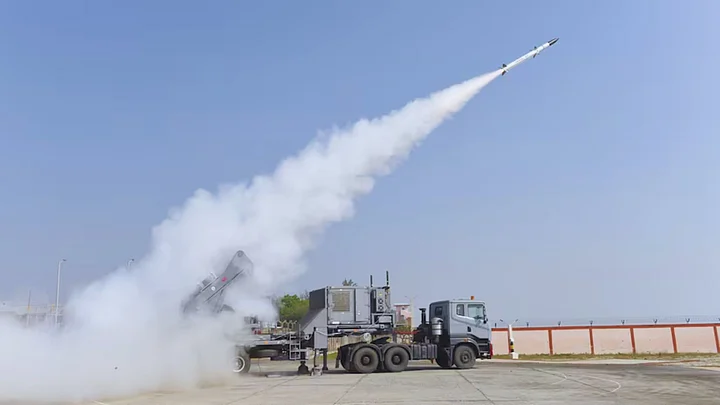India on Monday sent, for export, the first Akash surface-to-air missile (SAM) system battery to a "friendly foreign country", i.e., Armenia.
Then, a recent poll in Armenia conducted by the International Republican Institute’s Center for Insights in Survey Research, included, amongst other things, a view of Armenia's external relationships. A total of 11 countries were chosen. It was interesting to see that India was at the top of the list, which also included France, Iran, Russia, the US, and Turkey.
Moreover, a whopping 48 percent of respondents felt that relations with India were "very good", while 45 percent felt it was "good", far outstripping how respondents evaluated the current state of affairs with more traditional allies and friends like Iran, Georgia, Russia, and the US.
Soon after, a Finance Ministry report in India stated that Armenia had become the largest importer of weapons from India after deals for the Pinaka multiple-launch rocket system and the Akash anti-aircraft system materialised. The report also said that by the beginning of the current financial year 2024-25, the total purchase of weapons by Armenia from India had reached $600 million.
Defence relations are always long-term, and India-Armenia defence collaboration is poised to only grow.
Earlier this year, in May, the first defence consultations between the Ministries of Defence of Armenia and India were held in Armenia. The Armenia-India Defence Ministries 2024-2025 Cooperation Plan was signed, and an agreement was reached to form a collaborative task force. Both India and Armenia have posted defence attaches at their embassies in each other's countries.
This alone should incentivise India to elevate its partnership with Armenia to a strategic one. There are, however, other factors at play.
Armenia, situated in the South Caucasus range, occupies a geopolitically strategic location, bordering Iran, Turkey, and Azerbaijan. It is also often perceived as a bridge between Asia and Europe, the heart of the South Caucasus. Transport and trade corridors can connect Europe to Asia, including India. Gaining a foothold in the region is of long-term importance to India.
Armenia currently faces numerous security challenges.
It lost the contested ethnic-Armenian-populated territory of Nagorno-Karabakh after two decades of conflict with neighbouring Azerbaijan. This has enabled Armenia's long-time adversary Turkey, Pakistan’s close ally, to gain a foothold in the region as Turkish military counsellors and armaments won the war for Azerbaijan. Thousands of refugees have poured into the country from Karabakh.
The Ukraine crisis has exacerbated these concerns as Armenia's traditional defence ally, Russia, has been unable to fulfil some of its obligations under the Collective Security Treaty Organisation, a Moscow-led military bloc of which Armenia is a member. Armenia has currently suspended its membership in the CSTO.
This is what has necessitated Armenia's turn to India for arms procurements. According to Armenian officials, India now accounts for 90 percent of all of Armenia's arms purchases.
The export of military hardware is meant to boost India's defence industry and indigenous production. Defence cooperation between the two countries also envisages capacity-building for Armenia's defence forces and setting up joint manufacturing bases, synergised by the fact that the latter has a large pool of specialists. It can become a hub for further defence exports to countries in the region and beyond, for example, to Eastern Europe.
Next, both India and Armenia, while so different at first glance, live in difficult and hostile neighbourhoods. India has Pakistan on its western border to contend with and a detente is improbable given the recent spate of terror attacks in Jammu and Kashmir. Bangladesh has become a new challenge. Similarly, Armenia is wedged between Azerbaijan and Turkey, with whom it does not even have diplomatic ties.
Then, there is the geo-economic salience of Armenia for India. Events in the recent past have demonstrated numerous reasons for finding alternatives to the trade routes passing through the Suez Canal.
This is one of the reasons that trade corridors like the North-South Transport Corridor (INSTC) and, more recently, the India-Middle East Economic Corridor (IMEEC) were mooted. With the Middle East in the throes of conflict for more than a year, the IMEEC has been put on the back burner.
This makes it all the more significant that Armenia is part of the International North-South Transport Corridor (INSTC). The Indian ambassador in Tehran has said on record that India plans "…. to connect the western part of Chabahar [port] and the Indian Ocean with Eurasia and Helsinki in Finland, through the territory of Armenia, creating a North-South Corridor".
In fact, for India, the shortest route to the Black Sea and Southern and Eastern Europe runs from Iran's Chabahar Port to Armenia via the INSTC, connected to Armenia's North-South Transport Corridor, which would run further through the territory of Georgia to access the Black Sea ports of Batumi and Poti, and onwards to the Mediterranean and Eastern and Southern Europe.
At a recent strategic Yerevan Dialogue co-hosted by the Armenian Ministry of Foreign Affairs and the Observer Research Foundation, Armenian Prime Minister Nikol Pashinyan unveiled his government’s project launched to turn Armenia into the "Crossroads of Peace". Leveraging Armenia's unique location at the heart of the South Caucuses, the plan aims to turn the country into a trade, transport, and communications hub, and enable countries of the region to access European and Asian markets and vice versa.
This would herald more secure, stable, and sustainable trade and economic relations for the Eurasian region at large. An India-Armenia strategic partnership, therefore, becomes only logical and the robust bilateral ties must be institutionalised with a shared vision of peace and prosperity in the Eurasian region.
(Aditi Bhaduri is a journalist and political analyst. She tweets @aditijan. This is an opinion piece. The views expressed above are the author’s own. The Quint neither endorses nor is responsible for the same.)
(At The Quint, we question everything. Play an active role in shaping our journalism by becoming a member today.)
